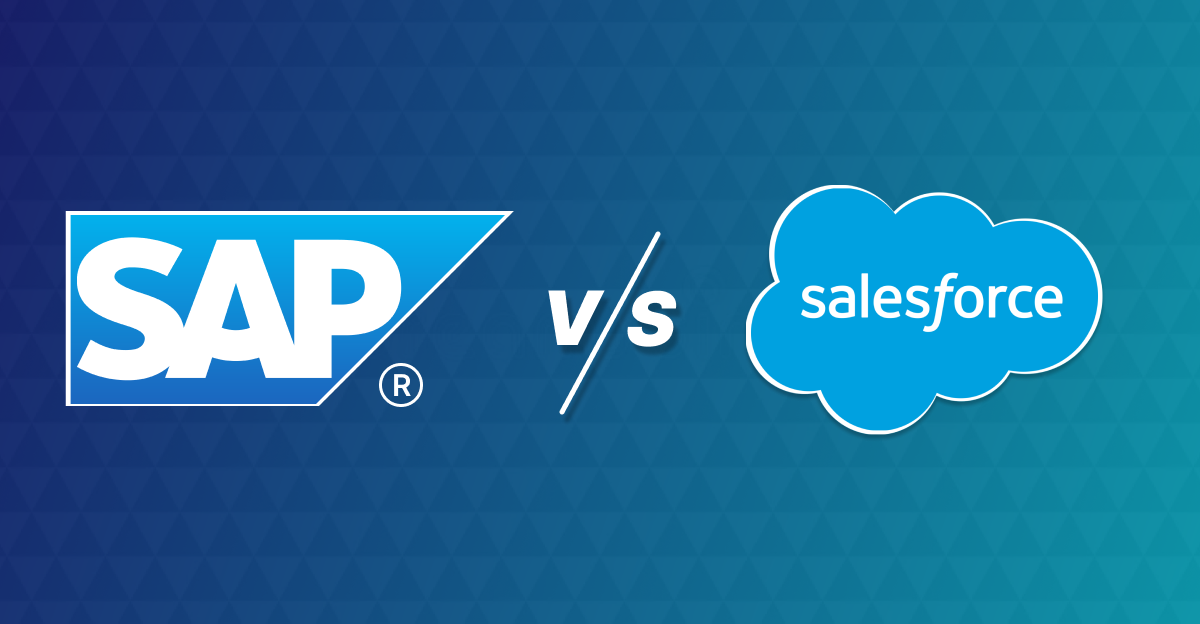What is SAP?
SAP, which stands for Systems, Applications, and Products in Data Processing, is a leading enterprise software company that provides a range of business software applications and services. SAP’s primary focus is on developing software solutions to help organizations manage their business operations effectively. SAP ERP solutions assists organizations integrate and manage their core business processes, such as finance, human resources, procurement, manufacturing, and supply chain management. SAP CRM solutions assist businesses in managing customer relationships, sales, and marketing activities.
What is Salesforce?
Salesforce is a cloud-based customer relationship management (CRM) platform that provides a suite of tools and services to help businesses manage and improve their relationships with customers and prospects. Salesforce is known for its flexibility, scalability, and user-friendly interface, making it one of the most popular CRM solutions in the market.
SAP CRM (Customer Relationship Management) and Salesforce CRM are two prominent solutions designed to help businesses manage and enhance their customer relationships.
Differences – SAP and Salesforce
- Integration and Data Connectivity
SAP CRM
SAP CRM is often part of the broader SAP ecosystem, allowing seamless integration with other SAP modules and systems.
Business intelligence in SAP CRM benefits from the integrated data model, providing a unified view of customer data across various business functions.
Salesforce CRM
Salesforce CRM emphasizes cloud-based architecture, allowing for easy integration with other cloud-based applications and third-party services.
Salesforce offers connectors and APIs for integration with external BI tools, enabling businesses to use their preferred BI solutions.
- Automation
In terms of automation, both Salesforce and SAP help clients automate tedious workflows and achieve efficiency at every level.
SAP, however, offers a competitive advantage. It is exemplary for hybrid (on-premise and cloud) environments. However, Salesforce would need to develop its own adaptors to perform integration between Salesforce and on-premise SAP ERP.
- Omnichannel Solution
SAP CRM supports omnichannel marketing strategies, allowing businesses to create and execute marketing campaigns that span multiple channels for a cohesive customer experience.
Salesforce, with its core strength in CRM, provides an omnichannel solution closely integrated with its CRM modules, including Sales Cloud, Service Cloud, Marketing Cloud, and Commerce Cloud.
- Usability and User Experience
SAP CRM
SAP CRM user interfaces can vary based on the specific SAP product and version.
Initiatives like SAP Fiori aim to improve the user experience with a more modern and intuitive design.
Salesforce CRM
Salesforce is known for its user-friendly interface, especially with the Lightning Experience.
Provides a streamlined and intuitive user experience for creating and accessing BI reports and dashboards.
- AI (Artificial Intelligence) and Machine Learning
Chatbots and Virtual Assistants
SAP CRM can integrate with AI-powered chatbots and virtual assistants to enhance customer interactions. These tools leverage natural language processing (NLP) and machine learning to understand and respond to customer inquiries.
Chatbots and Voice Assistants
Salesforce can integrate with AI-driven chatbots and voice assistants, enhancing customer service interactions through intelligent automation and natural language understanding.
Conclusion
SAP CRM is part of the broader SAP Business Suite, allowing for tight integration with other SAP modules, including ERP and Supply Chain Management. This can be advantageous for organizations seeking a comprehensive and integrated enterprise solution.
SAP is known for tailoring its solutions to specific industries. If a business operates in an industry where SAP has a strong presence and offers industry-specific functionalities, SAP CRM may be a better fit for meeting sector-specific needs and compliance requirements.
For organisations seeking a system that integrates smoothly with third-party applications, SAP’s CRM solutions are ideal.
About PositiveEdge
SAP is best known for its suite of enterprise software solutions that cover a wide range of business processes. This includes Enterprise Resource Planning (ERP), Customer Relationship Management (CRM), Supply Chain Management (SCM), Human Capital Management (HCM), and more. PositiveEdge is a SAP Partner Company in India, USA and UAE. Contact us for more information.
